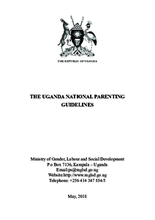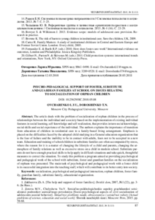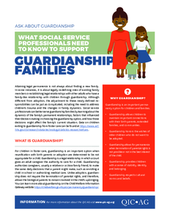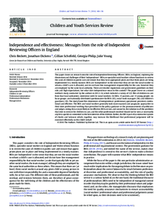Displaying 31 - 40 of 112
These Guidelines are for all persons taking care of children. The goal of these Guidelines is to empower parents, the family and community structures to effectively nurture children so that they can realise their full potential.
This paper explores the research literature relating to the guardianship of unaccompanied minors seeking asylum.
The article deals with the problem of socialization of orphan children in the process of relationships between the individual and a society based on the implementation of existing individual features in social learning, self-knowledge and self-realization, that provides in turn social knowledge, social skills and social experience of the individual.
This guidance is designed for social service professionals to better serve guardianship families by learning about the dynamics of the family’s permanent relationships, factors that influenced their decision-making in choosing the guardianship option, and how those decisions might affect the family’s current situation.
This brief reference surveys the national policy of three representative African countries on the legal guardianship of children who are without parents or families.
The paper draws on a mixed methods study the role and effectiveness of Independent Reviewing Officers in England.
This study seeks to contribute to the literature on child welfare and parental drug use in the United States by answering several research questions.
Undertaking a connected person / family and friends assessment is designed to help social workers to manage and complete a comprehensive and evidence-based assessment of connected people / family and friends who wish to foster or be special guardians to a known child or children.
Using data from a national longitudinal survey of children referred to child protective services (NSCAW II), this article compares behavioral, child/caregiver relationship, and school performance outcomes for children residing in kinship and nonkinship settings.
In this episode of “File on 4” from BBC Radio, Jane Deith investigates the practice of “Special Guardianship” orders in the UK, orders that grant legal guardianship of children to relatives or others who come forward to care for children when their parents can’t.




